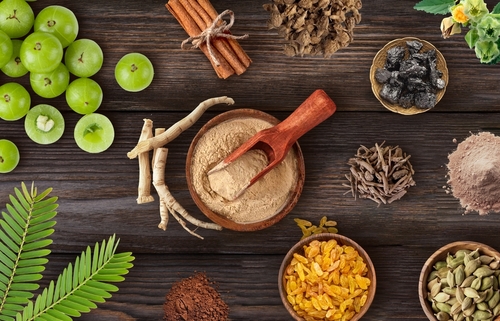I didn’t find adaptogens because I was curious—I found them because I was running on fumes.
There was a stretch of time when I’d wake up already anxious. My body was wired, but my brain was sluggish. I’d power through the day with caffeine and sheer will, only to crash into a restless, sleepless night. That relentless cycle was breaking me down. I didn’t need another band-aid. I needed real balance—something to help me rebuild the internal stability I’d lost.
That’s when I started hearing the word adaptogens. It came up in wellness circles I trusted. I brushed it off at first, thinking it sounded like just another wellness buzzword. But the more I read—especially the history and cultural roots of these plants—the more intrigued I became. And once I started using them with intention, they quietly changed everything.
The Nature of Adaptogens
The word adaptogen comes from the idea of “adaptation.” These are natural herbs and roots that help the body adapt to physical, emotional, and environmental stress. Unlike stimulants, which can push your system harder, or sedatives, which can shut it down, adaptogens work with your body to restore balance.
They don’t numb stress—they help you respond to it differently. That’s what stood out to me. They support the whole system: endocrine, nervous, and immune. And the effects are cumulative—gently building resilience over time.
Adaptogens have deep roots in traditional medicine. Ayurveda, Traditional Chinese Medicine, and Siberian folk practices all used these botanicals long before modern science caught up. The plants themselves—many of which grow in extreme climates—seem to embody resilience. It’s no wonder they pass that quality on to us.
Ashwagandha: Restoring Calm and Strength
Ashwagandha was my first adaptogen. I was drawn to it during a season of chronic fatigue and anxiety. The name means “smell of horse” in Sanskrit—said to reflect its earthy aroma and the vitality it imparts.
In Ayurvedic tradition, it’s considered a rasayana—a tonic for longevity and vitality. It nourishes the adrenal glands, helps regulate cortisol, and supports restful sleep. What I experienced was subtle but powerful: fewer spikes in stress, steadier energy, and a feeling of emotional grounding I hadn’t felt in years.
It didn’t sedate me—it fortified me. Over time, I felt more able to handle what life threw my way without the same reactive charge.
Maca: Fuel for Energy, Mood, and Hormones
Maca found its way into my kitchen later, but it quickly became a staple. Grown high in the Peruvian Andes, maca root thrives in brutal weather and thin air. It’s no surprise that it’s traditionally used to boost stamina, fertility, and hormonal health.
What I love about maca is its uplifting quality. It’s not stimulating like caffeine—but it gives you that sense of alertness and motivation without the crash. I found it especially helpful during times when my cycle felt off, or when I needed emotional resilience during long stretches of work or travel.
It has a malty, nutty taste that blends beautifully into smoothies, oats, or warm tonics. And over time, it supports the endocrine system in a way that feels like plugging back into your own power source.
Rhodiola: Mental Endurance in Hard Times
Rhodiola is for the uphill climbs—the big deadlines, the emotional turmoil, the mornings when you don’t think you can keep going.
It’s a cold-weather plant, found in the mountains of Siberia and Scandinavia, and it’s been used by athletes, soldiers, and scholars to promote stamina and concentration. In my own life, rhodiola came through during a time of deep emotional stress—grief, sleeplessness, and physical burnout all rolled into one.
Unlike ashwagandha, which calms, rhodiola sharpens. It supports serotonin and dopamine balance, helps regulate stress hormones, and improves oxygen efficiency. After a week of using it, I felt clearer, more present, and emotionally more buoyant—even in the middle of heartbreak.
How to Know When to Use Adaptogens
One of the most important lessons I’ve learned is that adaptogens aren’t one-size-fits-all. They’re not meant to be taken endlessly or mindlessly. They respond to your body’s needs, and your body’s needs change.
Here’s how I approach it:
-
When I’m feeling burned out, anxious, and wired-but-tired: I reach for ashwagandha. It helps calm the nervous system and support restful sleep.
-
When I feel low energy, disconnected, or my hormones feel out of sync: I use maca for its nourishing, mood-lifting support.
-
When I need sharpness, mental endurance, or I’m in a period of intense emotional or cognitive strain: I call on rhodiola for short bursts.
Some people rotate adaptogens with the seasons. Others use them in response to specific challenges. I use them like I would use food, movement, or rest—tools to bring myself back into balance.
A Note on Quality and Safety
If you’re exploring adaptogens, quality matters more than anything. These are powerful herbs—many used for thousands of years. You want them grown in clean soil, processed with care, and ideally certified organic.
I recommend working with single-ingredient powders or tinctures when possible, especially as you’re learning how your body responds. Start slow. Tune in. Let your body build a relationship with the plant.
And if you’re pregnant, breastfeeding, or taking medications, consult with a practitioner who knows herbal medicine. Adaptogens are generally safe, but they’re not inert. They have real effects—and real interactions.
Conclusion: Adaptation Is Strength
Adaptogens don’t offer escape. They offer resilience. That’s what makes them so different from the quick-fix mindset we’re used to. They don’t mask your symptoms—they help you meet your life with more capacity.
Since bringing them into my daily rhythm, I’ve felt more connected to my own cycles—more able to trust the ebb and flow of energy, mood, and emotion. Adaptogens don’t silence the noise—they help you find your center so you can rise above it.
If you’re navigating stress, fatigue, emotional heaviness, or hormonal shifts, adaptogens might be exactly the support you’ve been missing. Just know—it’s not about taking more. It’s about choosing wisely, listening deeply, and remembering that balance is something you build, not something you buy.
























